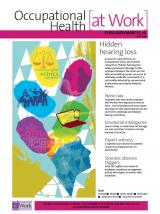February/March 2016 (vol. 12/5)
ContentsFeaturesNewsLegal
NewsResearch DigestResearch PlusCPD
Research Plus
Obesity linked to poor future work ability
A large-scale cohort study has identified a link between obesity and future work ability. It was part of the Northern Finland 1966 Birth Cohort, which followed over 96% of people born in two Finnish provinces in 1966. Questionnaires were sent to participants when aged 31, and those still living in the area were invited for a clinical assessment. Further questionnaires were completed 15 years later. Current perceived work ability compared with lifetime best was assessed on a scale of 0 to 10, categorised as good (score of 8 to 10) or poor (0 to 7). Complete data were available for 5,654 participants. At age 46, 32% of men and 28% of women who were obese had poor work ability; compared with 15% of men and 13% of women who were not obese. After controlling for basic education, work history, health behaviours and social support at work, being obese at the age of 31 increased the risk of having poor work ability 15 years later by 55% for men (relative risk (RR) = 1.55; 95% CI 1.22–1.97) and 82% for women (RR = 1.82; CI 1.45–2.28). Being obese at age 46, and becoming obese between the ages of 31 and 46, also increased the risk of poor work ability. Unhealthy behaviours (RR = 1.31; CI 1.06–1.61) and lack of social support at work (RR = 1.37; CI 1.13–1.67) at age 31, and a history of at least some unemployment (RR = 1.44; CI 1.21–1.71) were independently predictive of poor work ability at age 46. No information is given on future employment outcomes.
Occupational Health at Work February/March 2016 (vol. 12/5) pp36



